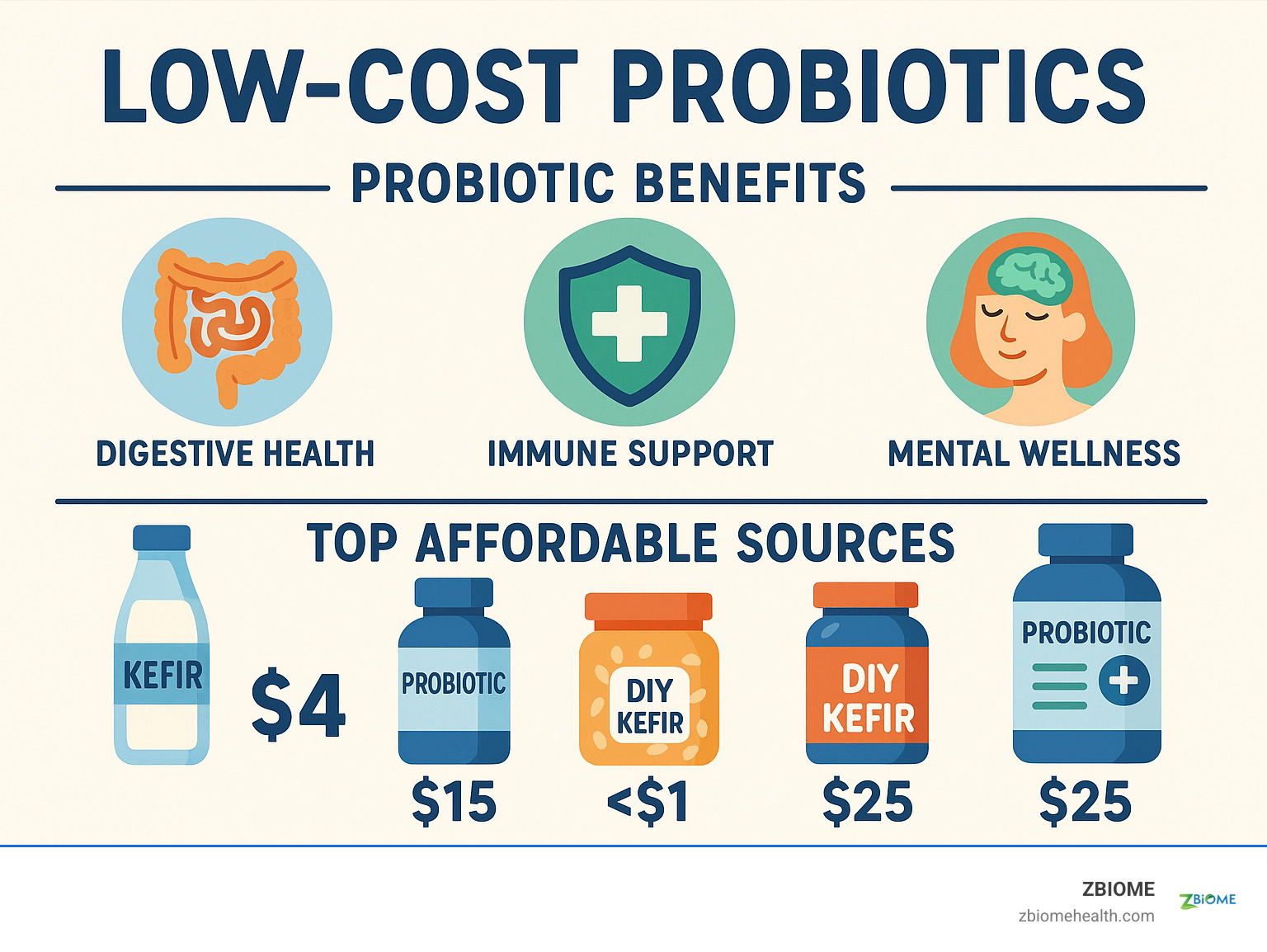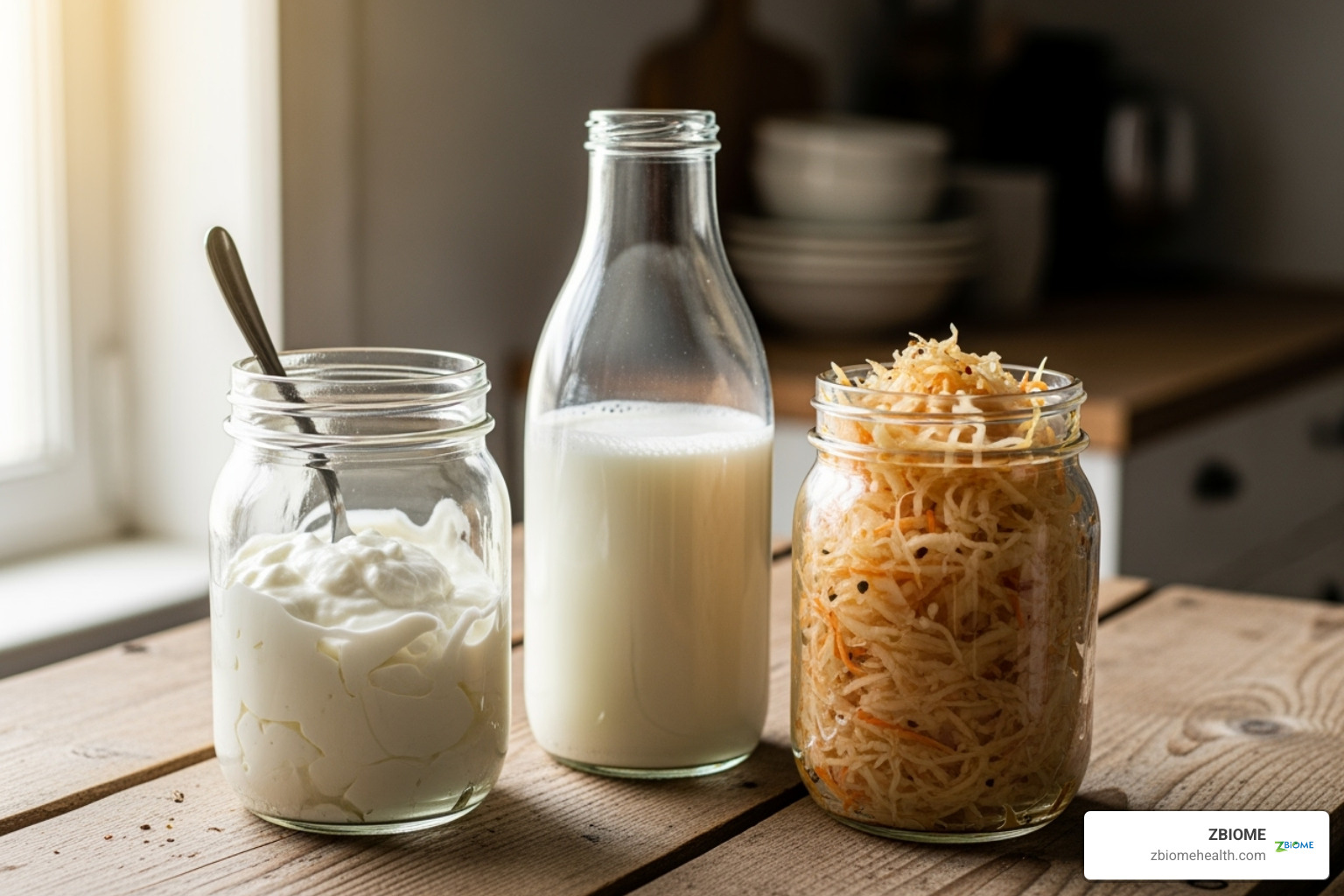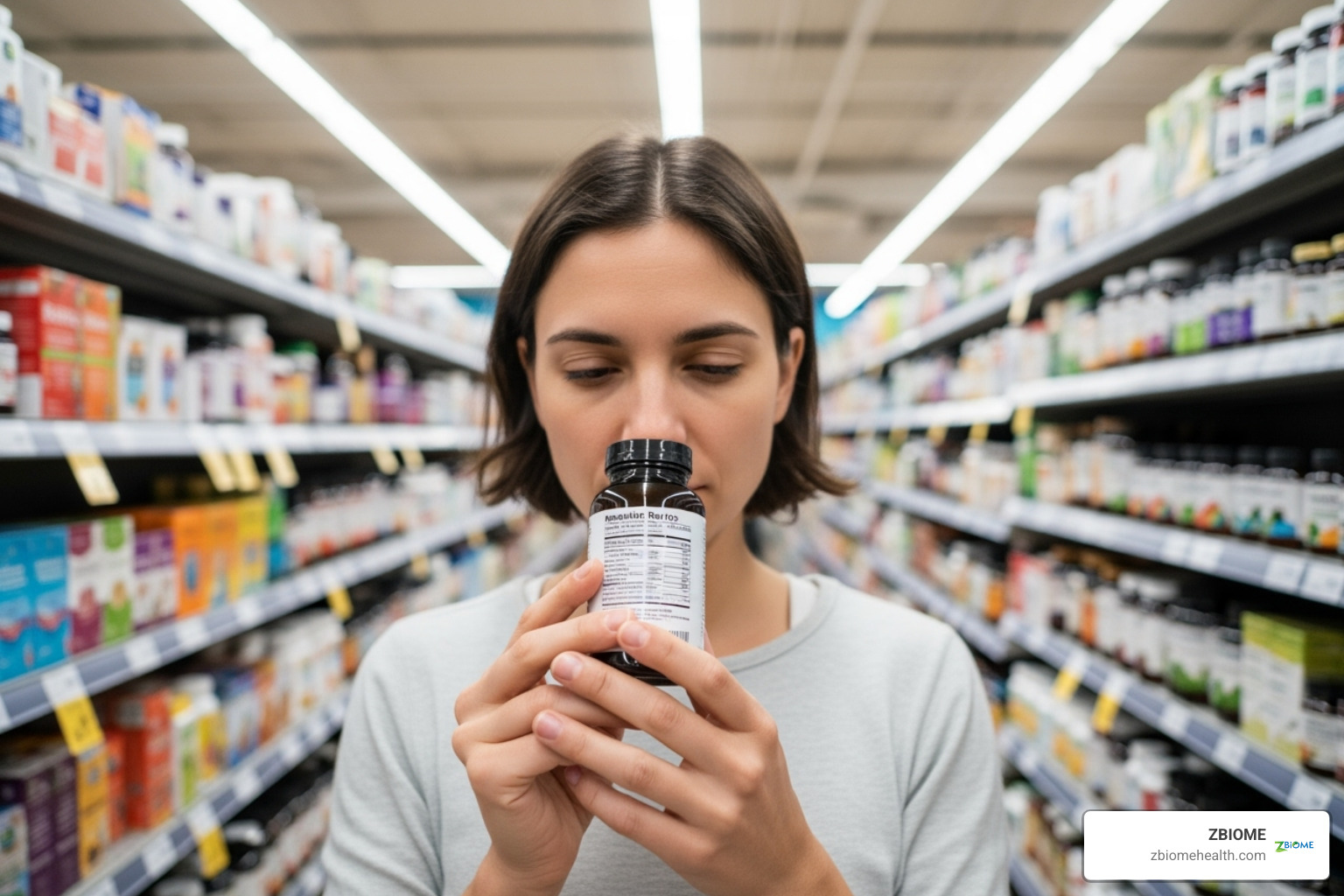Why Your Gut (and Wallet) Will Thank You for Finding Affordable Probiotics
Low cost probiotics don't have to mean sacrificing quality. You can find budget-friendly options that deliver real results for your gut health.
Top Affordable Probiotic Sources:
- Kefir - $4 per bottle at grocery stores (LifeWay brand)
- Spring Valley Probiotics - $12.47-$18.47 at Walmart
- NOW Probiotic-10™ - $33.89 for 50 billion CFU
- DIY Kefir - Make your own with Amazon kefir grains
- ZBIOME All-in-One - $27 for probiotics + prebiotics + enzymes
Your gut's microorganisms are crucial for digestion, immune function, and even mood. Research shows probiotics can help with IBS symptoms, bloating, and immune and mental wellness. The good news is you don't need to spend a fortune to get these benefits. As one forum user noted: "Kefir is $4 a bottle and stays good forever... Even cheaper is to make it yourself."
What matters most is that effectiveness isn't tied to price. Affordable options like kefir or quality store brands can be just as beneficial as premium alternatives. With options from fermented foods to supplements under $20, a healthy gut is more accessible than ever.
I'm Tarek El Ali, a healthcare consultant specializing in translating complex clinical insights into practical health solutions. My work in immunology has shown me that wisely chosen low cost probiotics can deliver significant health benefits, making gut wellness accessible to everyone.

Low cost probiotics word roundup:
- daily wellness routine
- digestive enzyme complex
- natural gut remedies
Decoding Probiotic Value: What to Look for Beyond the Price Tag
When shopping for low cost probiotics, the cheapest bottle isn't always the best value. An ineffective supplement costs you more in the long run. To ensure your money is well spent, you need to know what makes a probiotic valuable.
First, consider the CFU count (Colony-Forming Units), which measures the number of live bacteria per dose. Most experts suggest at least 10 billion CFUs per serving, though some research shows 1 million CFUs per gram can be effective. While more isn't always better, a higher count can offer more bang for your buck at a comparable price.
The specific probiotic strains are just as important. Different strains have different strengths. For example, Lactobacillus rhamnosus GG may help with bloating, while Saccharomyces boulardii is used for antibiotic-related digestive issues. Some brands focus on a single, well-researched strain, while others like ZBIOME's formula include multiple strains for broader coverage.
Always calculate the cost per serving. A $15 bottle requiring three daily capsules is more expensive than a $27 bottle that's one-a-day. Divide the total price by the number of servings to find the true cost.
Delivery method and shelf-stability are crucial. Probiotics are fragile and sensitive to heat, light, and moisture. Some require refrigeration, while others use delayed-release capsules to protect bacteria from stomach acid. Shelf-stable formulations, like those from NOW Foods, offer convenience and travel-friendliness.
Finally, look for third-party testing. This independent verification ensures what's on the label is in the bottle—a critical factor for budget options. Reputable brands, from store brands like Spring Valley to comprehensive formulas like ZBIOME, will have this testing done.
For a deeper dive, see these 6 Crucial Factors to Consider When Choosing a High Potency Probiotic. You can also explore the science behind dosing in this minimum effective dose research.
The bottom line: a smart shopper looks beyond the price to find probiotics that deliver results without breaking the bank.
Our Top Picks for Low-Cost Probiotics in 2024
After researching dozens of options, we've curated a list of low cost probiotics that deliver genuine value and effectiveness without breaking your budget.

Best Overall Value: ZBIOME's All-in-One Formula
At ZBIOME Health, we're proud of our all-in-one formula. It combines 60 Billion CFU of probiotics with 9 digestive enzymes and 4 prebiotics for just $27. This provides comprehensive gut support at a sensible price.
Most supplements only address one piece of the puzzle. Our formula supports the entire digestive ecosystem in one capsule, offering significant value compared to buying separate products. For example, Physician's Choice offers a solid 60 billion CFU probiotic with prebiotics for around $22, but it lacks the digestive enzymes that make our formula truly comprehensive. See how we stack up in our Zbiome vs. Physician's Choice comparison.
Best Store Brand Option: Spring Valley (Walmart)
Great low cost probiotics can be found on your local Walmart shelf. Spring Valley offers decent quality at excellent prices.
Their Probiotic Formula provides 30 Billion CFU for just $12.47, while their Acidophilus & Bifidus option has 6 Billion CFU in a 180-capsule bottle for $18.47. They even offer gummies. Spring Valley is accessible and a great starting point for anyone on a tight budget. While they may lack the extensive strain research of premium brands, Walmart has invested in their private label standards. You can browse their selection at Probiotics in Digestive Health - Walmart.com.
Best for High Potency on a Budget: NOW Probiotic-10™
For serious probiotic power, NOW Probiotic-10™ delivers 50 Billion CFU across 10 clinically validated strains for about $33.89. This works out to roughly $0.68 per serving—impressive value for this potency.
NOW Foods is respected for consistent quality and transparency. Their formula targets intestinal flora balance and immune support using research-backed strains. You can find it at retailers like Vitacost and Swanson's. The higher CFU count and strain diversity justify the price for those needing more potent support.
A Look at Premium Competitors: Align and Culturelle
To understand the market, it's helpful to look at premium brands. Align Probiotic costs $39.97 to $44.47 for its patented Bifidobacterium 35624 strain. Culturelle is similarly priced at around $46.98 for its well-researched Lactobacillus rhamnosus GG (LGG) strain.
Both brands have solid science, but you're also paying for marketing and brand recognition. The reality is that many of their benefits can be found in more affordable options. Our ZBIOME formula, for instance, provides comparable benefits plus enzymes and prebiotics at nearly half the cost. See the breakdown in our Zbiome vs. Culturelle comparison.
The takeaway: Premium pricing doesn't always mean premium results. Smart consumers can find low cost probiotics that deliver the same benefits without the brand name markup.
Natural and DIY Probiotics: The Ultimate Budget-Friendly Boost
Sometimes the best low cost probiotics aren't in supplement bottles but in your grocery store or kitchen. Fermented foods offer diverse, naturally occurring probiotic cultures at a fraction of the cost of supplements.

Fermented Foods: Your Grocery Store's Probiotic Aisle
Your local grocery store is packed with affordable probiotic powerhouses.
- Kefir: The champion of budget probiotics. A bottle from a brand like LifeWay costs around $4 and contains up to 61 different strains of beneficial bacteria and yeast—far more diversity than most supplements. Choose plain, unsweetened varieties for the most benefit.
- Yogurt: Look for "live and active cultures" on the label and avoid sugary options. Greek yogurt is often a good choice for its higher protein and concentrated probiotics.
- Sauerkraut & Kimchi: These fermented vegetables offer probiotics and fiber. Be sure to buy raw, unpasteurized versions, as pasteurization kills the beneficial bacteria.
- Kombucha: A popular, refreshing probiotic drink that's more affordable than daily supplements and a great soda replacement.
The Ultimate Hack for low cost probiotics: Make Your Own Kefir
For maximum savings, make your own kefir. It's simple and costs just pennies per serving. All you need are kefir grains and milk. Add the grains to milk, let it sit at room temperature for 12-24 hours, and you'll have fresh, potent kefir.
The grains multiply over time, so a one-time purchase can last forever. You can find kefir grains on Amazon for about $10-15, an investment that pays for itself within weeks. For instructions, check out this guide on How to make milk kefir.
Homemade kefir is often fresher and more potent than store-bought versions. While supplements from NOW Foods or Spring Valley are good options, nothing beats a living culture from your own kitchen. This approach puts you in control of your gut health without ongoing costs.
Smart Shopping Strategies and Potential Risks
Finding great deals on low cost probiotics requires knowing where to look and what to avoid. Let's explore how to score quality probiotics safely and affordably.

Where to Find the Best Deals on low cost probiotics
Affordable probiotics are widely available if you know where to shop:
- Walmart: A great source for budget-friendly options like their Spring Valley house brand.
- Amazon: Offers huge variety, customer reviews, and convenience, especially for DIY supplies like kefir grains.
- Costco: Ideal for buying in bulk if you have a membership, often featuring name brands at reduced per-serving costs.
- Vitacost & Swanson's: These online supplement specialists frequently have deep discounts on brands like NOW Probiotic-10™.
Many retailers also offer subscription services that save you 5-15% on recurring orders, making daily probiotics more affordable long-term. Always calculate the cost per serving to find the true value.
The Hidden Costs: Risks of Poor-Quality Probiotics
The cheapest option isn't the best value if it compromises your health. Here are the risks:
- Dead Bacteria: Poor manufacturing or storage can kill the live cultures, rendering the product useless. Established brands like ZBIOME invest in stability testing to ensure you get live, active CFUs.
- Contamination: Unregulated supplements may contain unlisted or even harmful microorganisms. This is why third-party testing is crucial.
- Misleading Labels: Some products list ineffective strains or count CFUs at the time of manufacture, not at expiration. Look for specific strain names and a guarantee of potency through the expiration date.
- Side Effects: Persistent discomfort after starting a new probiotic could indicate a poor-quality product. You can learn more about the Potential risks of probiotics.
- Special Populations: If you are immunocompromised or have serious health conditions, consult your doctor before taking any probiotic.
You can find safe, effective low cost probiotics by choosing reputable retailers and brands that prioritize quality testing. Our ZBIOME formula, for example, undergoes rigorous quality control to deliver its promised benefits safely. For guidance on starting a new regimen, see our 3 Tips for Managing Expectations When Starting Probiotics.
Frequently Asked Questions about Affordable Probiotics
Let's clear up some common questions about low cost probiotics to help you choose wisely for your gut and wallet.
Are more expensive probiotics always better?
Absolutely not. This is a common myth. High prices from brands like Align and Culturelle are often due to marketing and patented strains, not necessarily superior effectiveness. The real value is finding a product that works for you. Quality markers like third-party testing, viable strains, and proper manufacturing are not exclusive to expensive brands. Affordable options like Spring Valley ($12.47) or comprehensive formulas like our ZBIOME ($27) can be just as, or even more, effective.
How many CFUs do I really need?
It depends on your health goals. While most experts recommend at least 10 billion CFUs per serving for general health, more isn't always better. Sometimes, an extremely high dose can cause discomfort. Strain specificity is often more important than the raw CFU count. A diverse blend, like the 10 strains in NOW Probiotic-10™ or the mix in our ZBIOME formula, can provide broad-spectrum support. The key is finding a therapeutic dose that works for you without overpaying. For more, see this Scientific research on probiotic dosage.
Can I trust store-brand probiotics?
Yes, you can often trust store brands, but you must be a savvy shopper. Major retailers like Walmart and Costco have a reputation to uphold with their house brands like Spring Valley. These products are often made in the same facilities as name-brand supplements. When evaluating any low cost probiotics, look for clear strain labeling (e.g., Lactobacillus acidophilus), proper storage instructions, and expiration dates. Customer reviews can also provide useful insights. Store brands can offer excellent value, but the most important factors—viable strains, proper manufacturing, and a suitable formulation—apply to any product you choose.
Conclusion: Invest in Your Gut Without Breaking the Bank
Supporting your gut health doesn't have to be expensive. From homemade kefir to well-researched supplements under $30, effective low cost probiotics are available for every budget.
The key lesson is that value trumps price. A $50 supplement isn't better than a $15 one if it lacks the right strains or viable bacteria. Smart shoppers prioritize CFU counts, specific strains, proper storage, and third-party testing.
Natural options like kefir offer incredible value. For supplements, brands like Spring Valley (around $12-18) and NOW Probiotic-10™ (about $34) provide excellent, affordable choices. While premium brands like Align and Culturelle have their merits, their high prices ($40+) can be a barrier. This is why we created the ZBIOME Health formula.
Our all-in-one supplement combines 60 Billion CFU probiotics, 9 digestive enzymes, and 4 prebiotics for just $27. We offer comprehensive support that rivals premium brands at a fraction of the cost, bridging the gap between affordability and effectiveness.
Your gut health journey can start today with an affordable, high-quality choice. The key is consistency and choosing a product based on quality, not marketing.
Ready to give your gut the support it deserves without the premium price? Find the all-in-one solution for your gut health and find how low cost probiotics can transform your wellness and your wallet.




